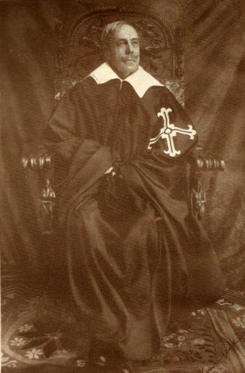Henrique Mitchell de Paiva Couceiro
|
His Excellency Henrique de Paiva Couceiro OTE KSBA GCCE FC |
|
|---|---|
 |
|
| President of the Government Junta of the Kingdom of Portugal |
|
|
In office 19 January 1919 – 14 February 1919 |
|
| Monarch | Manuel II of Portugal |
| Interim Governor-General of Angola | |
|
In office 24 May 1907 – 22 July 1909 |
|
| Monarch |
Carlos I of Portugal Manuel II of Portugal |
| Preceded by | Ernesto Augusto Gomes de Sousa |
| Succeeded by | Álvaro António da Costa Ferreira |
| Personal details | |
| Born |
30 December 1861 Lisbon, Kingdom of Portugal |
| Died | 11 February 1944 (aged 82) Lisbon, Portuguese Republic |
| Military service | |
| Nickname(s) |
The Paladin The Great Lightening |
| Allegiance | Kingdom of Portugal |
| Service/branch | Portuguese Royal Army |
| Years of service | 14 January 1879 - 14 February 1919 |
Henrique Mitchell de Paiva Cabral Couceiro (30 December 1861 in Lisbon – 11 February 1944 in Lisbon) was a Portuguese soldier, colonial governor, monarchist politician and counter-revolutionary; he was notable for his role during the colonial occupation of Angola and Mozambique and for his dedication to the monarchist cause during the period of the First Portuguese Republic through the founding of the Monarchy of the North.
He was born to José Joaquim de Paiva Cabral Couceiro, a notable engineer in the Portuguese Army and Helena Isabel Teresa Mitchell, an Irish Protestant who converted to Catholicism (after being educated in a convent in France). Following her widowed father's death, the 20-year-old Helena Mitchell worked for a time in Madrid, before taking residence in Portugal as the governess to the Viscount do Torrão's children. It was as the children's teacher that she met the engineer José Couceiro and later married, giving birth to two daughters (Carolina and Conceição) and their only son Henrique.
Helen Mitchell was a militant Catholic, and the young José was raised in a strict authoritarian environment, where he read little of the popular literature, never went to the theater, attended mass daily and similarly read Imitação de Cristo daily in preparation of the "ultimate sacrifice". Similarly, his life was quite regimented: he went to sleep at 11 and woke at 6 in the morning, fenced for an hour, went to mass, had two hours training on horseback daily, and regularly shined his boots, brushed his suits and cleaned most of his personal items. Helena Mitchell instilled in her son a religious zeal and military regime; at the age of 11 she gave him a copy of the History of the Crusades, Ivanhoe and he read and re-read a copy of Don Quixote, while fostering ethos of the medieval knight: austerity, valor, abstinence, service to God and to country.
Destined by family-upbringing to join the military, after concluding his preparatory studies in Lisbon (January 14, 1879), at 17 years of age, he volunteered for service in the 2nd Cavalry's Royal Lancers Regiment, a position that he would serve until 1880. At that time he transferred to the 1st Artillery Regiment, and enrolled in the Military Academy at the Escola Politécnica de Lisboa ("Polytechnic University of Lisbon"), where he studied artillery between 1881 and 1884 as an officer candidate.
...
Wikipedia
